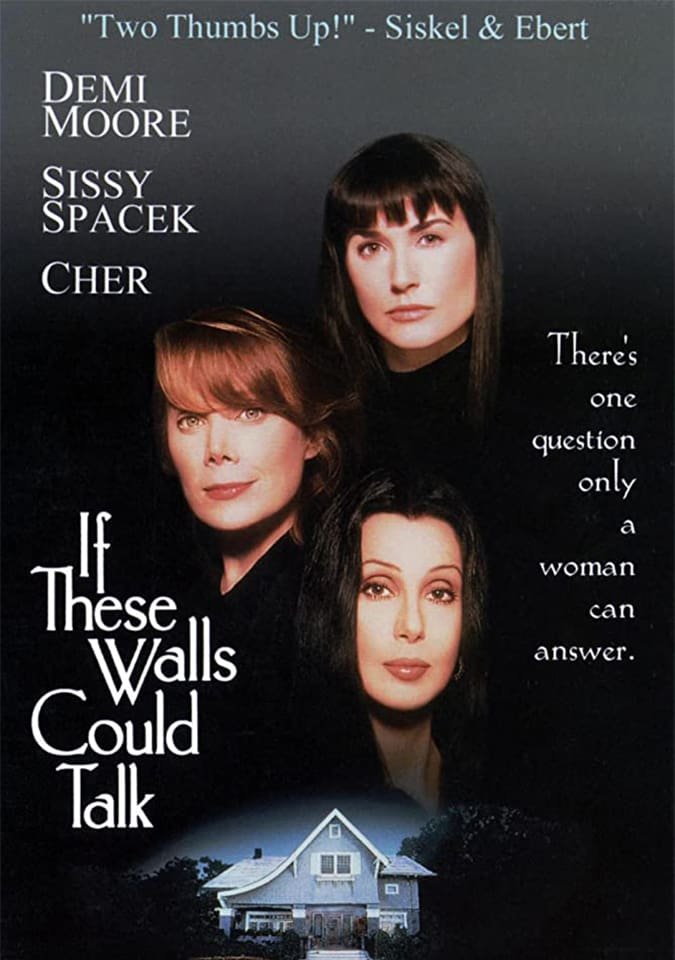Retro Film Review: If These Walls Could Talk (1996)

In past few years USA tried to give impression of national unity, but there are still issues that cause deep divisions within that country. The most notable is abortion, which inflames passions seldom witnessed in any other modern democracy. For some observers this issue - which puts people in clearly defined camps with deep convictions, entrenched position and impossibility of healthy compromise - is as inflammatory as the debate over slavery in early part of 19th Century, and some worry that it could end the same way. All this is, of course, the reason why Hollywood studios chose not to touch this thorny subject with a ten foot pole. Cable television is another matter and some very interesting films were made about this subjects in 1990s. The best known of them all is 1996 anthology film If These Walls Could Talk.
The plot of the film takes place in a same house during three different time periods. First segment, directed by Nancy Savoca, takes place in 1952. Claire Donnelly (played by Demi Moore) is a nurse whose husband had been killed in Korean War. Short and careless affair with her brother-in-law leaves her with unwanted pregnancy. Abortion is illegal at the time, which leaves Claire with few options, some of them incredibly unpleasant and risky. Second segment, also directed by Nancy Savoca, takes place in 1974. Abortion has just been made legal and this represents viable option for Barbara Barrows (played by Sissy Spacek), married mother of four whose unexpected pregnancy had messed up plans of her entire family - faced with extra mouth to feed, her husband must reconsider his early retirement; her oldest daughter must reconsider her going to college while Barbara must re-think her going back to school and finishing her education. Third segment, set in 1996 and directed by Cher, deals with Christine Cullen (played by Anne Heche), architecture student who just got pregnant with her professor and now must reconsider her options while local abortion clinic becomes the target of fanatical anti-abortion activists.
Authors of If These Walls Could Talk don't hide what side in the abortion debate they support. However, even with such clear bias, they can't be accused of making this film into cheap propaganda of women's abortion rights. Savoca and Cher have directed their segments very well and all of them, despite being written by different people, leave impression of being part of coherent whole. The most effective segment is the first one which uses naturalistic approach to show how the women handled such problems in a age before legal abortion. The scene in that segment are very graphic and could probably disturb some gentler parts of the audience. The last segment is, on the other hand, most problematic. Because of its sharp criticism towards anti-abortion movement it is closest to propaganda. However, the worst thing is Cher, who is somewhat hard to imagine in the role of abortion doctor, although she partially absolves herself for that choice with skilful direction. Although not as effective as Rain Without Thunder, this TV piece shows that the serious issues could still be handled by American filmmakers.
RATING: 7/10 (+++)
(Note: The text in its original form was posted in Usenet newsgroup rec.arts.movies.reviews on May 14th 2003)
==
Blog in Croatian https://draxblog.com
Blog in English https://draxreview.wordpress.com/
Brave browser: https://brave.com/dra011
BTC donations: 1EWxiMiP6iiG9rger3NuUSd6HByaxQWafG
ETH donations: 0xB305F144323b99e6f8b1d66f5D7DE78B498C32A7